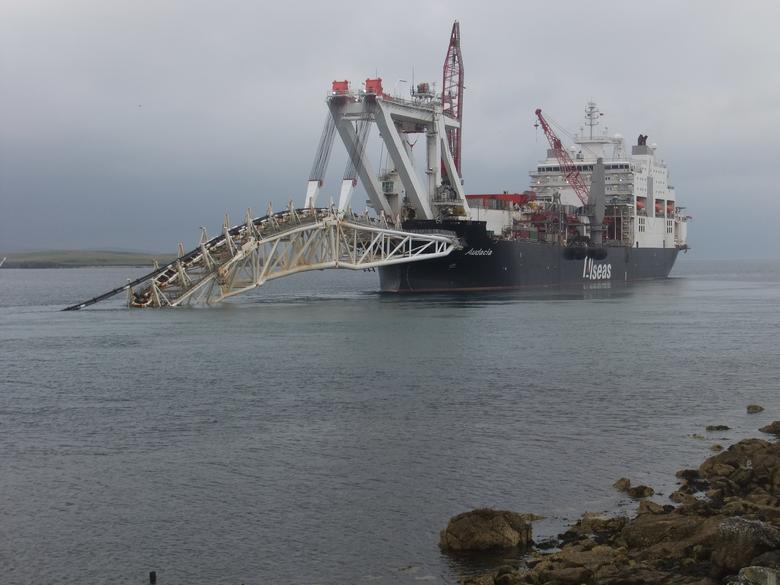
TOTAL STARTS GAS PROJECT

One of the last big North Sea projects sanctioned under high oil prices has begun pumping natural gas, highlighting an unexpected boom in U.K. energy production that analysts say is unsustainable.
French oil company Total SA said Monday that a deep-water natural-gas project west of the Shetland Islands called Laggan Tormore will produce the equivalent of 90,000 barrels of oil a day—almost 6% of the U.K.'s total output.
Laggan Tormore is part of $50 billion of U.K. offshore projects that were commissioned in recent years when oil prices were $80 a barrel or more. Now those developments are coming onstream, helping companies working off the U.K.'s coast to pump an estimated 8% more oil and gas in 2015, about 1.6 million barrels of oil equivalent a day.
The U.K. North Sea was once one of the world's great oil basins, with production that peaked in 2000 with 4.7 million barrels of oil equivalent a day. The region is home to the Brent oil field that underpins the global pricing benchmark and was the breeding ground for technology that allowed oil companies to drill in deep, stormy water.
The North Sea's fields, many in production since the 1970s, have gone into a rapid decline in recent years, with production falling to less than 1.5 million barrels a day in 2014 as the fields emptied out. Squeezing out some of the last petroleum there can be some of the costliest projects in the world.
A project led by Total committed to invest $5 billion in Laggan Tormore in 2010, when oil prices were $80 a barrel and rising. Few projects of its size, scope and technical difficulty would be launched now, with oil prices hovering around $30 a barrel, analysts said.
Oil prices are trading some 70% below their peak in 2014, amid a global glut of crude that far outpaces daily demand. The price collapse has fueled concerns that the decline of North Sea oil will accelerate.
At current oil prices more than one-third of fields are running at a loss, said Mike Tholen, economics director at Oil & Gas U.K., an advocacy group for oil companies.
"The question is what's next after the current wave of investment has worked its way through," Mr. Tholen said.
Even before oil prices crashed from a peak of $115 a barrel in 2014, the North Sea was struggling. Escalating costs, dwindling opportunities, technically challenging fields and a complex tax structure had already posed significant challenges for the companies.
One project still awaiting sanction is the Rosebank development led by Chevron Corp. In 2013, Chevron delayed its final investment decision on Rosebank, also west of the Shetlands, because of rising costs.
Chevron said the company remains focused on improving the economics of the multibillion-dollar development and is still conducting additional engineering work.
"It is premature to make any statement on a final investment date for the project," the company said in a written statement.
Companies have cut back on exploration drilling, which means there will be fewer opportunities to tap in the future. Last year, companies were forecast to have drilled only 14 exploration wells, down from about 40 in 2014, according to Oil & Gas U.K.
Much of the infrastructure—the pipes, platforms and processing facilities that keep the oil and gas flowing—is old, requiring constant maintenance and repairs. The smaller companies that work on squeezing the last drops from older fields have struggled to raise the necessary financing because of the lower oil prices and have scaled back work.
The total volume of oil and gas produced on the U.K. Continental Shelf, typically known as the North Sea, rose 8.6% in the first 10 months of 2015, compared with a year earlier, according to the U.K.'s Department for Energy and Climate Change.
Output in November and December historically tends to be more stable, which would result in a full-year increase of 8%, Oil & Gas U.K. said. Oil and gas output totaled 1.49 million barrels of oil equivalent a day in 2014.
Utility SSE PLC of the U.K. and Dong Energy of Denmark also have stakes in Laggan Tormore.
-----
More:





